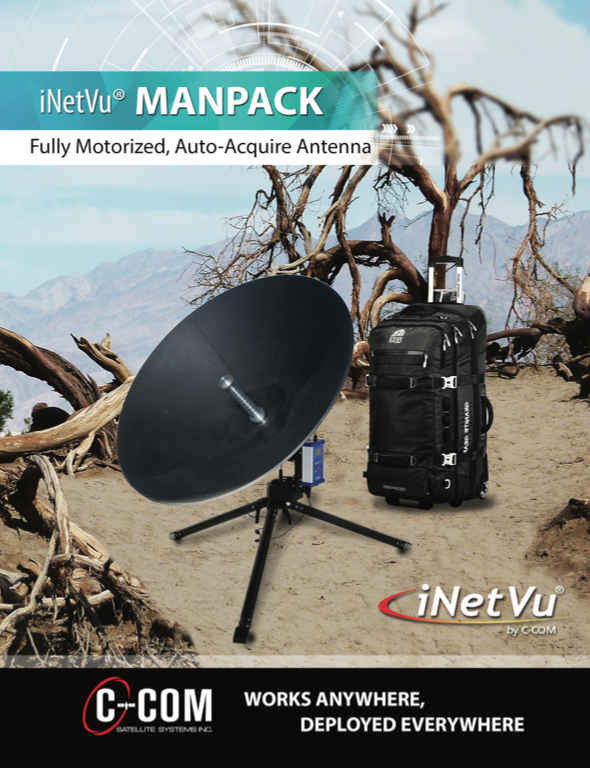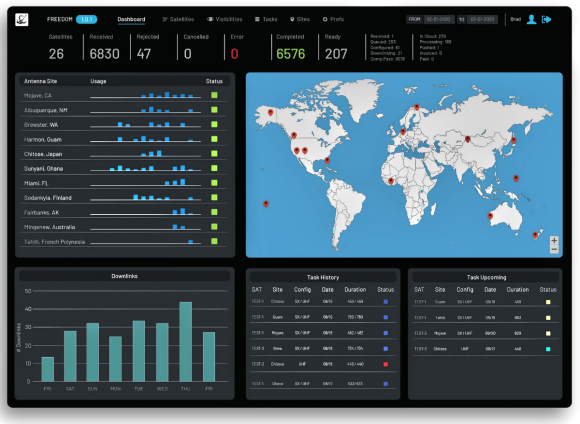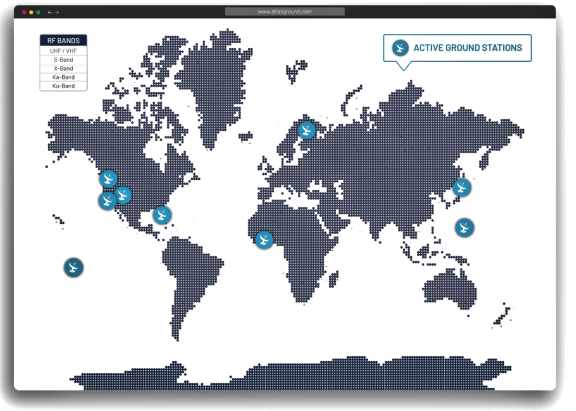ATLAS Space Operations Founder and Chief Strategy Officer, Mike Carey, has been a vocal part of the satellite communications and technology industry’s dialogue since the onset of the worldwide push to work from home due to COVID-19. Mike has previously touched on best practices regarding communications and team management, but he says that there’s still a dynamic missing from the dialogue that is already happening in professional circles.
Good day, Mr. Carey. Would you please tell us about your background and how you decided to leverage your career at ATLAS Space Operations?
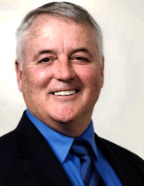
Mike Carey (MC)
I served in the US Air Force for 32 years prior to co-founding ATLAS Space Operations. I enlisted as an avionics technician, where I learned the basics of RF communication, RADAR, and electronic systems and was ultimately promoted to Major General. I had the privilege of being
a space operations officer for the majority of my time in service, and covered the waterfront of missions from satellite command and control to space surveillance, launch operations, nuclear operations, cyber operations and missile defense missions.
Transitioning from the U.S. Air Force to ATLAS was easy in that ATLAS Space Operations supports the needed infrastructure to enable on-orbit spacecraft by providing communications for their operational command and control.
I’ve had decades of experience in satellite communications and telemetry service, so it was a natural fit to establish a more modern means of providing the service commercially.
Could you give us a brief history of the company and how and why the firm was established?
MC
ATLAS was founded on the principle of lowering the cost barrier to space-based data. Industry incumbents reflect much of the Cold War-era infrastructure their government customers became accustomed to, which resulted in high costs to new entrants in the space sector. Costs had been driven down in launch and satellite manufacturing, but there had not been any innovation within the ground segment.
Sean McDaniel (CEO) and Brad Bode (CTO) envisaged a modern satellite ground network that was cloud-enabled over a decade ago. However, it wasn’t until 2014 when Mike Rendine joined them that the idea became a reality. Initially an LLC under Assured Space Access Technologies, Inc. — a company owned by Sean McDaniel and Mike Rendine — ATLAS was incorporated in 2015. In 2017, we planted the headquarters flag in Traverse City, Michigan. It is in Michigan where we found the investment interest, optimal business environment, operating costs and talent to thrive. We are now over 30 employees strong with more than a dozen antennas operating around the world.
Many firms in the space communications and data market sectors describe themselves as “disruptors” in these space industries… does ATLAS Space Operations fall into that category and, if so, how?
MC
Many firms do, indeed, claim to be disruptors, but it’s more credible when a third party states such is true about a company. In 2017, ATLAS was named by Morgan Stanley as one of the top 12 industry disruptors. To be clear, we disrupted a calcified segment of the industry that over-charged for telemetry and data, compelled clients to adhere to their availability and was not attuned to modern software and cloud-hosting. Being cloud-agnostic insinuates one doesn’t care about the cloud interface and leaves it to the customer. ATLAS’ software service is multi-cloud capable, flexible and enabled. We’re not agnostic about much.
Mike, ATLAS has been vocal about its willingness and ability to transition to a work-from-home model. What were some contributing factors that allowed ATLAS to make a smooth transition?
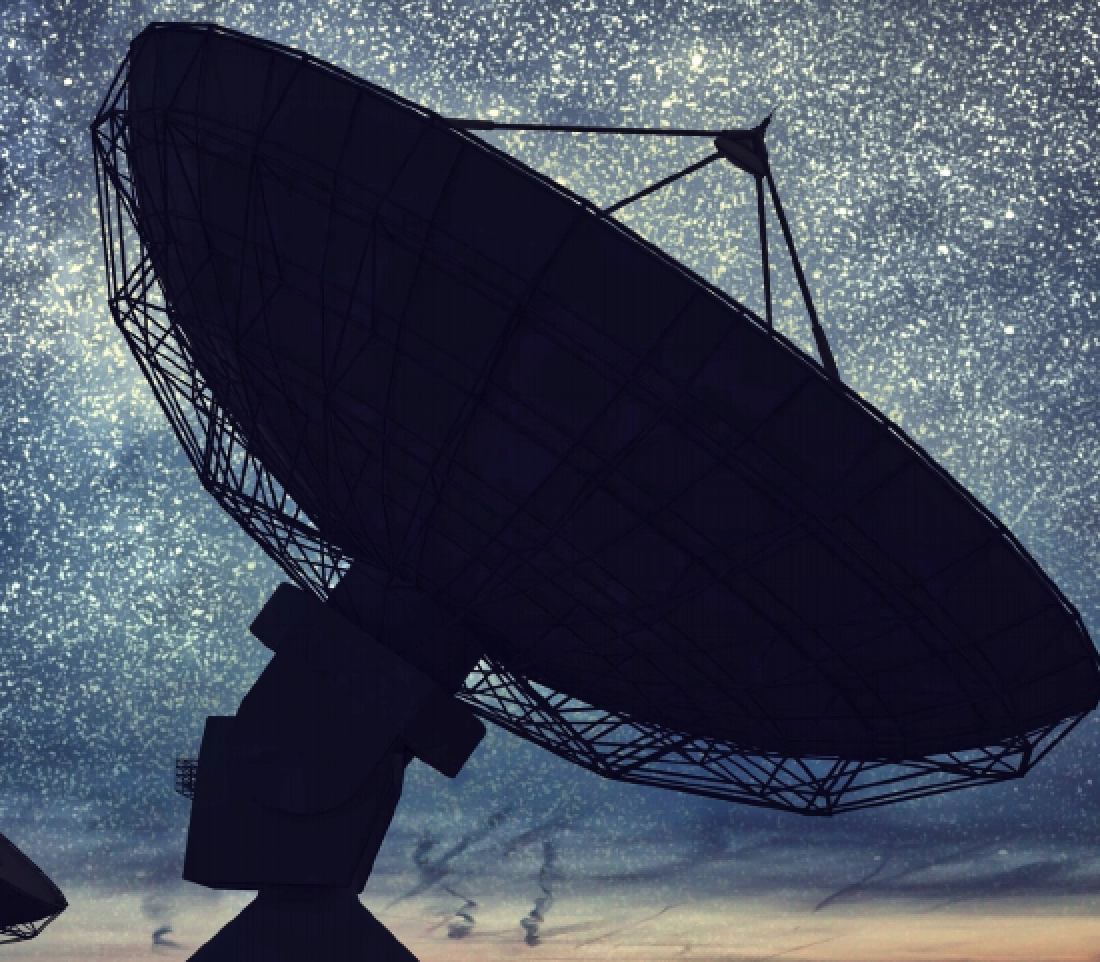
MC
As I like to say, the single most important aspect of ATLAS’ culture allowing us to adapt to the rapidly evolving situation over the past months is our approach to internal communications — but there is something that has been missing from the conversation. I believe the tools that companies use, and how they test and refine their use of those tools, will either enable them, or stall their efforts when the unforeseen happens. Whether you’re working with email or virtual meetings, it’s critical to have a plan in place for your company’s use of digital communication. What we are seeing now is people who weren’t utilizing these tools beforehand trying to play catch-up for lost time.
When you say tools, we’re talking about web apps?
MC
Sort of. The majority of communication occurs through the internet — now more than ever — but the tools we’re using are sometimes a substitute for interactions that would have normally been conducted in person. The key is to find tools that enable your company to work in a way that most efficiently supports efforts to work remotely. So, when I say “tools” I’m referring to services such as Teamwork, Gchat, Zoom, Chime, Teams, Discourse, etc. — these are all tools we’ve been using and assessing the effectiveness of for a while.
As we shifted our work out of the office, it was a matter of refining and expanding our toolset, rather than testing and implementing. We were able to transition from collaborating in person to collaborating by video. It’s the utility that we are able to derive from these services, and the ways in which they bridge physical gaps, that makes them tools.
What practices do you think made ATLAS better prepared for a situation such as this?

MC
For our team, it wasn’t so much a matter of going out of our way to adopt remote working practices, but rather an extension of how our team has always worked. ATLAS was founded as a distributed team, and roughly half of our team continues to work remotely. The ability to interact with our staff in a productive and meaningful way — regardless of where they were — was an innate part of our growth and normal business practice.
As a result, our readiness wasn’t necessarily “how do we prepare for a highly contagious disease that will fundamentally change work as we know it,” but rather “how do we best ensure that we are prepared for the unexpected?”
Leaders must constantly consider alternate operating scenarios, and building in flexibility adds to your resiliency. In military, space, and technology settings, teams are always working to be as well prepared as they can be without necessarily knowing the details of how a challenge will present itself.
A scenario in which everyone who isn’t deemed essential in the office must begin to work from home wasn’t on many peoples’ radar, but as a function of our dynamism and day-to-day expectations of work and communication, it has been an occasion that we are able to rise to meet.
And it was just this practice of having already worked in a semi-remote fashion that allowed you to be prepared?
MC
Well, that’s certainly a big part of it, but I think that largely it’s due to the mindset of resiliency and readiness that our team has. What made us strong is that from our inception, we focused on our customers’ needs and let those parameters guide us. Among those needs was the ability to offer continuous, lights-out operation. That’s why you see features in our software that allow for customers to schedule communication with their satellite remotely, and the ability to reach out to our team and tailor our offerings to their needs — we don’t need to be in the same room as them to do that, and we don’t need to be in our office to do it. That didn’t happen because we thought it was important to do business that way, it happened because we knew it would be important for our customers.
Interesting. Surely there were still changes that you experienced in making this transition though, what differences have you noticed within your team as a result of moving to work-from-home?
MC
There have absolutely been changes, and I believe that each change offers a valuable commentary on the way that we were doing work, and it has informed the way that we approach our future of work. It’s boiled down to a question of efficiency for us. In a pursuit to spend time wisely, to be prepared, to maintain satellite communications systems that remain resilient even when travel is shut down entirely, we have really had to refocus on the most efficient way to get those things done. So, to answer your question, I think that there are two key takeaways:
One is time management. We need a way to display to the rest of our team what our availability is, how long a given task will take, how much time we will need to finish a project, and what the priorities of our work are. Traditionally, the bulk of this work could happen in person, with conversations in an office space or in passing.
Now, if a team member wants to know something or get feedback, they can’t look in my office and see that I’m busy, they can’t wait until I walk by — now they have to check my availability and reach out. The good news is that this has caused us to think far more critically about our time.
How long does a meeting need to take? Most platforms default a new meeting to one hour — do we need that? This causes us to focus on a smaller number of topics, it causes us to shorten the dialogue regarding those topics, and it causes us to be conscientious of others’ time so that we can each maximize our efficiency as individuals and as a team. All of this allows us to spend more time providing world class service and capabilities to our customers.
Another change that has stood out is that I’m seeing and speaking to people more frequently. If I didn’t have something scheduled with another team member, it’s possible that I wouldn't have any substantive task-related dialogue with them for a few days.
Now, the intervals that I see people at have been drastically shortened. Every morning I see the team, we get to discuss anything important and reach out to people that we might not normally have interacted with. This means that the time it takes for a decision to be made has been drastically reduced. If there’s a problem, or if someone just needs a go/no-go, that can happen in a few seconds when we’re all together — there’s no back-and-forth and verifying with other stakeholders; managers are there and can drive rapid change.
Are there any pitfalls in the industry that you’ve witnessed as this situation has progressed?
MC
I certainly think that the government — and really at all levels — has its work cut out for it. Specifically, in roles where employees are meant to work with classified material, we’ve seen projects come to a complete standstill. It’s a hard issue for them to tackle. By design, their infrastructure is set up so employees cannot take their laptop home and continue work.
As we’re seeing now, though, there must be some solution moving forward. In a world where we can’t have people share tight spaces or use the same paths of travel, how do you keep the gears moving? I think that this will serve as a learning experience and in the future, you’ll see brand new contingency plans, maybe too many, that take this sort of scenario into mind.
As you review your career to date, what projects or missions truly bring a sense of satisfaction to you?
MC
Wow, that’s a fun question. Between my time with ATLAS and my 30 yrs in the Air Force, there are many events, projects and missions that I am very proud of. The most satisfying, however, share one thing in common: the people. Talented and passionate people tackling a difficult task... and succeeding... that is what’s satisfying to me.
A few examples are when ATLAS accomplished it’s first mission using our Freedom™ software and we dazzled the customer, exceeding their expectations. Or watching our team travel to the far reaches of the world to establish a new ground station. It was the ATLAS team in Ghana, Tahiti, Guam and Japan, for example that did the hard work along with the software team that brought our vision to life.
My time in service was satisfying when we helped others and solved hard problems. Establishing the US Space Range, National Security Space Institute, and several other organizations that are now key to the new US Space Force were each uniquely satisfying — but each time, it was because of the people around me.
Any final thoughts?
MC
The bottom line for me, and the entire ATLAS team, is that we have been served well by cultivating a work environment where we distinctly prefer to work together, while appreciating that we must be prepared to work remotely. Communication, infrastructure, technology — it’s all part of the solution, but a mindset of preparedness and resiliency is what will get you through times like this.
Now as we plan to come back into the workplace, at least a good portion of us, there are new considerations that we are addressing. As with ATLAS, other companies will find varying levels of comfort amongst their employees. Being respectful and supportive through active communication and planning will enable continued operations in what is definitely a fluid environment.
Be well and press on. atlasground.com/


